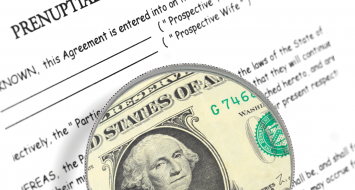All You Need is Love?
February 8, 2024
Reading time: 3 minutes

The season of love may not be so sweet when you are a divorce attorney. And, with emotions already running high, disgruntled clients keep divorce and family law practitioners near the top of the list of lawyers facing legal malpractice claims.
Divorce litigation, often the product of broken hearts, is one of the most contentious areas of practice. As such, these seemingly straightforward Model Rules of Professional Conduct may mean something different to you as you represent a soon-to-be ex-spouse in a bitter divorce proceeding:
- Rule 1.2: Scope of Representation and Allocation of Authority Between Client and Lawyer
- Although clients may determine the purpose of the legal representation, they do not dictate the means to achieve the desired outcome. You can (and should) passionately advocate for your client’s desires concerning custody and property while directing how to accomplish their objectives. Don’t get caught in the fray to the extent the way you handle the case and conduct yourself has a negative impact on a court ruling.
- Rule 1.3: Diligence
- Although we all do our best to timely move cases forward, clients may have unreasonable expectations when it comes to how long their divorce will take. Zealously advocating for your client does not mean using inappropriate tactics or treating opposing counsel or their client disrespectfully. Work diligently but take care to always maintain your professional rapport.
- Rule 2.1: Advisor
- A lawyer must exercise independent, professional judgment and offer candid advice. This Rule also permits you to offer legal advice flavored with moral or social factors that often come into play in divorce cases. However, you can suggest that your client meet with a therapist or business consultant if they would be better suited to advise your client concerning a specific issue.
- Rule 3.1: Meritorious Claims and Contentions
- Remember, you cannot assert a position or take any action on behalf of your client to harass the opposing party. Your client may want to do this because emotions are high, and they are actually looking for some sort of revenge or retribution. Yet, any claim or defense you advance must be supported by a good faith argument. So, make sure you have the complete factual support before proceeding. This may mean further vetting the information your client presents to you as fact to ensure you comply with this ethical obligation.
One of the most frequent claims filed against divorce attorneys is for failure to take certain actions such as conducting discovery to uncover relevant assets or hiring an expert to perform an appraisal or valuation which resulted in an unfair judgment. The attorney may have discussed these options with the client, but the client wanted to avoid spending money on discovery or an expert. Having written documentation of this discussion and agreement would be extremely valuable in defending this type of claim. So put it in writing!
Another common claim is that the client did not understand the terms of the settlement. So, confirm the client understands and agrees to the terms of the settlement on the record. Asking the right questions on the record can provide the attorney with a defense to this type of legal malpractice claim. Under a judicial estoppel defense, the client can’t testify that they understand the terms of the settlement in the divorce case and then claim that they didn’t understand the terms of the settlement in the subsequent malpractice case. So, make sure this understanding is captured on the record.
As a divorce attorney, practicing law in the land of broken hearts can be complicated. There is usually extreme tension between the parties, and one (or both) of them will probably feel that the end result is unfair. A little patience and tough love may be the only way to help your client navigate the complexities of a divorce. And remember, take care to protect yourself from a malpractice claim or grievance as you practice in an area filled with high emotions and potentially unrealistic expectations (not flowers and chocolates).
Additional Family Law content

I Knew You Were Trouble (AttPro’s Version)
No attorney can be fully insulated from a legal malpractice claim or grievance, but there are certain precautions that can be taken to minimize exposure to such claims. One important risk management tool is the strict screening of all cases before they are accepted into the practice. Rejecting cases with certain “red flags” can go a long way in preventing otherwise avoidable malpractice claims and grievances. Here are eight important questions to ask before accepting any new case.

Wedding Planning Checklist: Does Your Client Need a Prenup?
Your client may have the venue booked and flowers ordered, but do they need a prenup? As always, be sure to check your jurisdiction’s laws concerning the drafting and enforceability of prenuptial agreements. However, below is a brief checklist to consider before counseling your client concerning a prenup:
Information provided by AttPro Ally is not intended as legal advice. This publication provides best practices for use in connection with general circumstances and ordinarily does not address specific situations. Specific situations should be discussed with legal counsel licensed in the appropriate jurisdiction. By publishing practice and risk prevention tips, Attorney Protective neither implies nor provides any guarantee that claims can be prevented by the use of the suggested practices. Though the contents of AttPro Ally have been carefully researched, Attorney Protective makes no warranty as to its accuracy, applicability, or timeliness. Anyone wishing to reproduce any part of the AttPro Ally content must request permission from Attorney Protective by calling 877-728-8776 or sending an email to [email protected].
© 2025 AttPro Ally. All rights reserved.